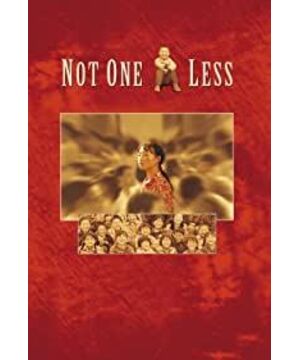"No One Can Be Missed" looks like a great reunion film, but in fact, it is full of ridicule and ridicule. The overall play escapes the in-depth study of real issues and turns to the expectation of closure, which is to admit defeat to power.
The two most important concepts in this film are neither education nor mountains, but reflections on the contrast and differences between backward civilization and modern civilization. Zhang Yimou's brushstrokes have such colors, the dilapidated countryside has warm and warm sunshine, the distant mountains are connected, and the composition of the shots tends to be stable. The urban landscape after that is indifferent, with a sense of alienation in the crowd.
First of all, from the motive of "one must not be missing", it is not very gentle. "Ask for money" has become Teacher Wei's motive. Asking for money is actually a matter of survival, not out of responsibility and responsibility, but for one's own consideration. . The old teacher who was looking for a substitute teacher has worked for many years without a penny. Compared with Teacher Wei, the latter is more worthy of admiration. But when did Mr. Wei wake up? In the paragraph about the chalk diary, Mr. Wei had an indirect education, and this education gave him a sense of responsibility.
The contradictions in the second half will naturally be able to stand, one cannot be missing, and one or two will inevitably be missing. Large-scale shots are gathered in the city scene. Cars are not rubbed, people are thrown halfway, and cars are not allowed to sit, and what is left by whizzing is the indifference of modern civilization. In the end, Mr. Wei was only allowed to enter the city with the worst and worst tractor, which made people feel cordial.
In terms of styling and attire, Mr. Wei is dressed in colorful clothes to contrast with city residents, as if entering a foreign country. This is a strong contrast between a backward civilization and a modern civilization. People surround and observe and feel that it is an anomaly. Such a scene is a bit too much. Deliberately, because according to common sense, it is normal for a rural person to enter the city, but the film reinforces this difference all the time.
The ruthlessness of the car conductor, the impatience of the station staff, and the aunt who was on duty at the TV station door had completely different attitudes towards Mr. Wei and the people in the city. The two registered people were wearing sunglasses, and what the sunglasses can best reflect is A loneliness and isolation. Most of the food that the lost child can get is out of sympathy. The sympathy is given through dress and demeanor. The well-meaning proprietress said, "I don't lack this bite to eat." The fundamental purpose is to not let him Shaking in front of guests. The rules and regulations followed by the aunt in the reception room are even more the rejection of interpersonal and emotional relationships in modern civilization. Teacher Wei wore it for three days and kept asking people with glasses, showing a scene of isolation, "We don't have time to talk to you. "
An interesting passage mentions that the modern media is faster than the public security bureau and the courts. This further reinforces this ridicule and banter. No one reads the tracing notices, and the public security bureaus and courts are overcrowded but do not handle them. Looking for someone but not reporting the crime, but going to the media to seek people's tears. Where do these tears come from? When I see you outside, I’m afraid to avoid it. When I get home and see TV, I donate money. Most of the benevolence and morality in modern civilization are motivated by self-movement. People surrender to technology and machines, and look for emotions and ideas on TV.
When he was on the TV recording program, Mr. Wei didn't speak for a long time. It was a panic. At the end, he shed tears, and the help from the back could be established. I wondered what would happen if I didn't cry all the time and was just frightened by the camera?
Most of the material assistance, the financial support, and the task-style completion of the previous play were indispensable. After that, on the way back to the village, under the genial scene, there is the production and consumption behind the camera.
What is really lacking, happens to be something the film didn't make. The material problem of rural education is not bad, the basic knowledge problem, the education problem, the teacher actually asks a 13-year-old girl who can only sing two songs to bear it. The class is just copying the textbook, and the task is that you are not allowed to run out. Next is the question of means of assistance. It is actually through the media rather than a specific organization. The public security court's case handling efficiency is so low that the general public perception is that advertising space is better. The aid was mostly money, and the colorful chalks that made the kids laugh. Just like the little boy said, he will go to high school when he grows up, and the camera does not continue to shoot. If you ask again: "How to take the test?" of powerless dreams and hopes.
Going a step further, how many people have not been assisted behind the assistance that this primary school has such a scarce opportunity. The video didn't show either. The seemingly gorgeous film actually produces a sense of skepticism about modern civilization and shows the means of educational assistance in mountainous areas. I don't want everyone to be drowned in tears of self-moving.
View more about Not One Less reviews








